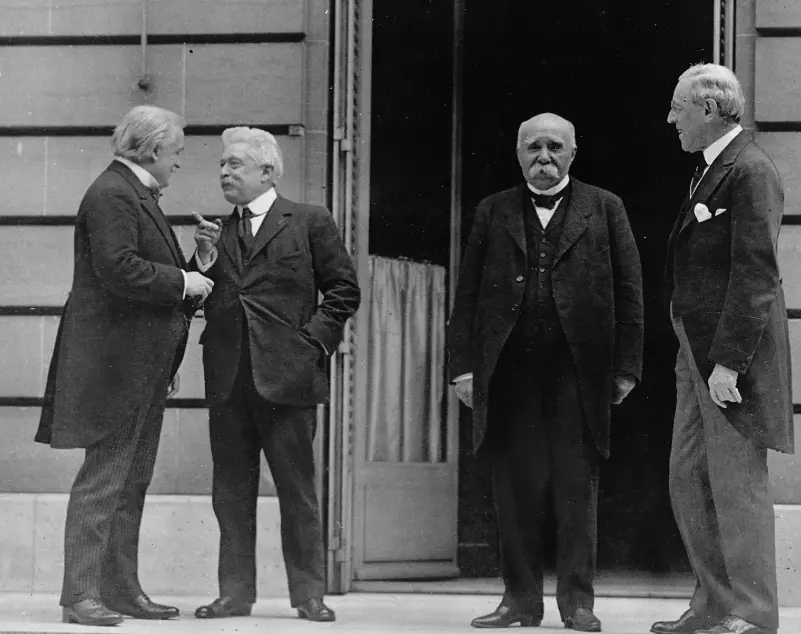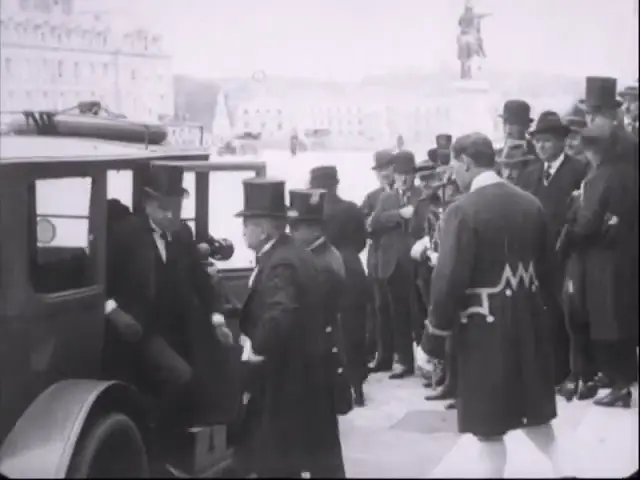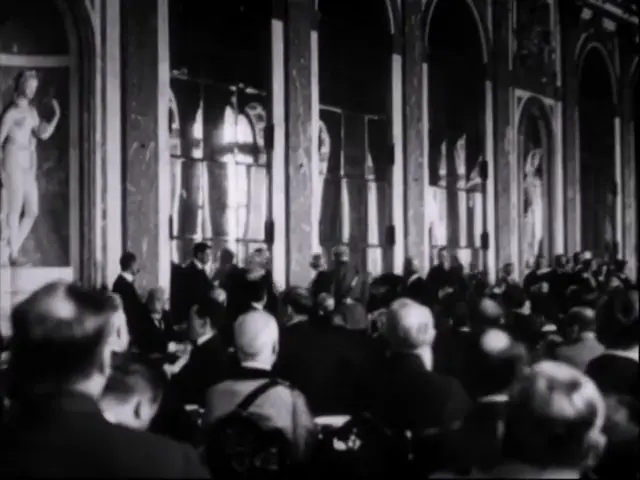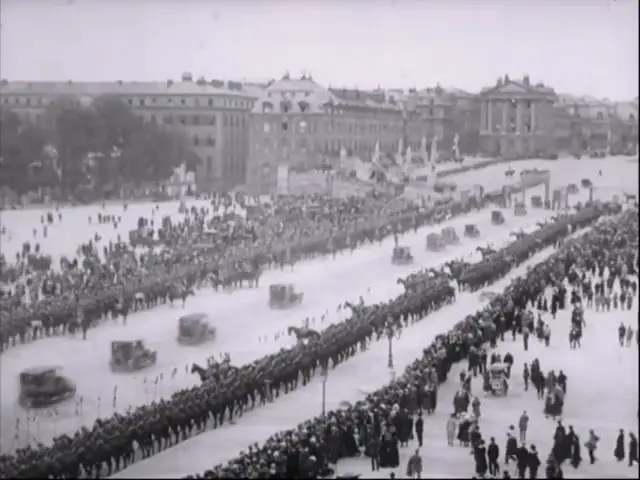
The Big Four (on the right): David Lloyd George (Britain), Vittorio Orlando (Italy), Georges Clemenceau (France), and Woodrow Wilson (USA), key figures of the Treaty of Versailles
The Treaty of Versailles marked a significant turning point following World War I. It was a peace treaty that officially ended the state of war between Germany and the Allied Powers.
The treaty, signed on June 28, 1919, aimed to impose strict terms on Germany. These terms shaped the political landscape of Europe for decades.
This article clarifies the origins of modern geopolitical tensions and provides a comprehensive look at the key terms and outcomes, including the formation of the League of Nations. The Treaty sought to create lasting peace but left a legacy of controversy and resentment.
The complexities of international diplomacy can often seem overwhelming. You will gain insight into its lasting impact by unpacking the details and highlighting the events that followed its signing.
Overview of the Treaty of Versailles

The Treaty of Versailles was signed on June 28, 1919, in the Hall of Mirrors at the Palace of Versailles.
The Treaty of Versailles was a pivotal agreement that ended World War I and imposed significant consequences on Germany. This section explores its background, terms, and impact on future events.
What Was the Treaty of Versailles?
The Treaty of Versailles was a peace treaty that ended the state of war between Germany and the Allied Powers. It was signed on June 28, 1919, in the Hall of Mirrors at the Palace of Versailles.
The treaty laid out punitive measures against Germany, including territorial losses and reparations. The treaty is often criticized for its harsh terms, which contributed to economic hardship in Germany and resentment that later fueled World War II.
Versailles Peace Treaty: A Historical Context
The Versailles Peace Treaty emerged from the Paris Peace Conference, where diplomats from 32 countries gathered to negotiate after World War I. The conference’s primary aim was to establish conditions for lasting peace.
The Treaty of Versailles was among several treaties produced during this conference. It required Germany to disarm, make substantial territorial concessions, and pay reparations to the Allied countries.
The treaty’s Article 231, known as the “War Guilt Clause,” forced Germany to accept full responsibility for the war. This added to national humiliation and led to political instability within Germany.
The Significance of the Versailles Agreement
The significance of the Versailles Agreement lies in its profound impact on the geopolitical landscape of the 20th century.
The treaty reshaped Europe’s borders, impacting countries like Poland and the newly formed Czechoslovakia. It also had long-lasting effects on international relations, ultimately leading to the establishment of the League of Nations.
Many historians argue that the harsh terms imposed on Germany sowed the seeds for World War II. The terms fueled economic strain and nationalist fervor.
Additionally, the treaty’s failure to establish a mechanism for fair revision contributed to its criticism and the eventual rise of extremist movements that exploited public discontent.
Key Events Surrounding the Treaty
The Treaty of Versailles was a pivotal document formally aimed to end World War I. It imposed significant changes on Germany, which influenced global politics.
Key events included the major Versailles Peace Conference, the treaty signing, and the location of these historical acts.
The Versailles Peace Conference
The Versailles Peace Conference played a crucial role in shaping post-WWI Europe. This conference occurred in Paris and involved many Allied powers, each with its agenda.
Key figures in the discussions were leaders such as Woodrow Wilson from the United States, David Lloyd George from the United Kingdom, Georges Clemenceau from France, and Vittorio Orlando from Italy. They debated the conditions that Germany would face under the treaty.
The primary aim was to establish peace and prevent future conflicts, yet different interests led to disagreements and compromises among the participants. These negotiations resulted in articles restricting Germany’s military capabilities and outlining reparations, shaping international relations for years. The conference was about ending the war and setting a new world order.
When Was the Treaty of Versailles Signed?
The Treaty of Versailles was finalized and signed on June 28, 1919. The date holds symbolic significance, marking five years since Archduke Franz Ferdinand‘s assassination, which sparked World War I.
The timing aimed to underscore the continuity of history from the war’s beginning to its official end with this agreement. This historic signing occurred after months of intense negotiations at the Versailles Peace Conference.
The delay in finalizing the treaty was due to the complexities of reaching a consensus among the Allies on how to deal with Germany. The signing represented the conclusion of long diplomatic efforts to construct a treaty that would reshape Europe and ensure a lasting peace. However, it would later contribute to the rise of diverse tensions.
Where Was the Treaty of Versailles Signed?
The treaty was signed in the opulent Hall of Mirrors at the Palace of Versailles in France, a location chosen because of its historical and symbolic importance.
With its grand architecture and significant place in French history, the Palace of Versailles offered a fitting backdrop for signing a treaty of such magnitude. Here, the powers gathered to end the state of war with Germany formally.
The Hall of Mirrors has historically been used for important ceremonies and state functions, making it an ideal setting for this historic event. The choice of venue underscored France’s prominent role in the negotiations and carried rich symbolism, connecting future peace with past glories of French history.
Terms and Provisions of the Treaty
The Treaty of Versailles, a pivotal document following World War I, set harsh terms for Germany while aiming to ensure long-term peace.
It included territorial changes, military restrictions, and economic reparations. These measures had significant impacts on post-war Europe.
Treaty of Versailles Terms Explained
The Treaty of Versailles, signed in 1919, was a cornerstone of the post-World War I peace process at the Paris Peace Conference. It reshaped the map of Europe, requiring Germany to cede territories to Belgium, France, Poland, and other nations. Alsace-Lorraine returned to France, and the Saar Basin came under League of Nations control.
Another key provision was the demilitarization of the Rhineland, creating a buffer zone between Germany and Western Europe. Germany’s military capabilities were sharply curtailed, limiting its army to 100,000 troops and banning tanks, armored vehicles, and military aircraft. The treaty also dissolved the German General Staff.
Reparations played a substantial role. Germany had to compensate the Allies for war damage. These financial obligations burdened Germany’s economy, contributing to later financial instability. The treaty’s stringent terms fostered resentment in Germany, creating an environment that facilitated Adolf Hitler’s rise to power.
What Did the Treaty of Versailles Require Germany to Do?
The treaty imposed numerous demands on Germany. Among them, Germany had to accept responsibility for causing the war, outlined in what became known as the War Guilt Clause. This clause made Germany liable for reparations that crippled its post-war economy.
Economically, Germany faced reparation payments equaling billions of gold marks, severely impacting its financial stability. Territorial losses diminished Germany’s industrial output and economic capabilities.
The treaty also called for reducing the German army to a minimal defense force and dismantling fortifications at its western borders.
Politically, the treaty banned any future union between Germany and Austria, a provision meant to prevent the rise of a German-dominated Europe. These actions sought to weaken Germany and prevent further conflict, yet they also sowed discontent that later fueled World War II.
Treaty of Versailles Article 231: Understanding the War Guilt Clause
Article 231 of the Treaty of Versailles, often known as the War Guilt Clause, placed sole responsibility for the war on Germany and its allies. This clause justified the reparations and became one of the treaty’s most controversial elements. Many Germans viewed it as a national humiliation.
The War Guilt Clause labeled Germany as the aggressor, which generated significant resentment and nationalism within Germany. It also laid the groundwork for the financial demands imposed by the treaty, legitimizing the reparations as compensation for the losses suffered by the Allies.
The clause significantly influenced post-war German politics. Many historians contend that the resulting resentment contributed to the eventual rise of Nazi ideology. This clause exemplified the treaty’s broader impact, as its punitive measures sought peace but inadvertently set the stage for future global conflict.
Impact and Consequences
The Treaty of Versailles, signed in 1919 at the Versailles Peace Conference, significantly affected post-World War I Europe. It triggered political changes, altered national boundaries, and influenced international relations, laying the groundwork for future conflicts.
How Did the Treaty of Versailles Lead to WW2?
The Treaty of Versailles directly impacted the rise of tensions that erupted into World War II. By imposing heavy reparations and significant territorial losses on Germany, the treaty created widespread resentment among Germans.
These harsh measures exacerbated economic hardship during the Great Depression and fueled nationalist sentiments, paving the way for Adolf Hitler’s rise to power.
Hitler exploited the anger and disillusionment caused by what many Germans saw as an unfair treaty. He used promises of reversing its terms to gain support, subsequently ignoring restrictions set by the treaty.
This led to aggressive expansionist policies that ultimately contributed to the outbreak of World War II. The treaty’s failure to create lasting peace highlights its role in the conflict’s genesis.
Was the Treaty of Versailles Fair?
Critics often debate the fairness of the Treaty of Versailles. While the Allies sought to punish Germany for its role in World War I, many viewed the terms as excessively punitive. Germany was forced to accept full responsibility for the war, agree to substantial territorial losses, and pay hefty reparations.
Some contemporary observers and historians saw these conditions as excessively harsh. The perceived injustice led to feelings of betrayal and victimization among Germans.
Conversely, nations like France justified the terms as necessary for preventing future aggression. This disparity in views underscores the complexity of assessing the treaty’s fairness.
The Treaty of Versailles Forced Germany To…
The Treaty of Versailles required Germany to make many significant concessions. It had to cede territories to neighboring countries, such as Alsace and Lorraine, France, and parts of Prussia to Poland.
Additionally, Germany was obligated to demilitarize the Rhineland, limiting its military capabilities and severely restricting its armed forces and resources.
Furthermore, the treaty mandated that Germany accept full responsibility for initiating World War I, an assertion formalized in Article 231.
This so-called “war guilt clause” was particularly humiliating for Germany and a significant source of resentment. The combination of territorial losses, military restrictions, and reparations payments significantly weakened Germany’s post-war economy and political stability.
Legacy of the Treaty of Versailles
The Treaty of Versailles deeply influenced global politics and economics after its creation. Its terms shaped international relations and sparked significant geopolitical shifts, which left lasting effects on world history.
Why Did the US Reject the Treaty of Versailles?
Multiple factors drove the United States’ rejection of the Treaty of Versailles, but concerns about the League of Nations were central. Critics worried that joining would commit the U.S. to international conflicts without congressional approval. Prominent figures like Senator Henry Cabot Lodge voiced strong opposition.
Another issue was the belief that the treaty failed to treat all parties fairly. Some argued it harshly punished Germany, potentially fostering future resentment.
Domestic priorities also influenced the decision. Many Americans favored isolationism during the post-World War I period, focusing on internal recovery and avoiding entanglements abroad.
These factors collectively led to the U.S. Senate’s rejection of the treaty despite President Woodrow Wilson’s efforts to promote it.
Significance of the Treaty of Versailles in World History
The Treaty of Versailles significantly altered the landscape of international politics. It ended World War I but imposed heavy reparations and territorial losses on Germany. This peace treaty was pivotal in shaping the interwar period.
Often seen as harsh, the treaty led to economic strain and political instability in Germany. It paved the way for radical movements, setting the stage for World War II.
The treaty redefined national boundaries, creating new states while dismantling empires. It also established the League of Nations to promote peace, though it eventually proved ineffective. The Versailles Peace Treaty left a complex legacy, contributing to the following geopolitical tensions.
Closing Remarks
The Treaty of Versailles marked a pivotal moment in history, closing the chapter on World War I. Signed on June 28, 1919, it was the primary treaty officially ending the war between Germany and the Allied Powers.
Key Elements of the treaty included imposing harsh penalties on Germany, such as significant territorial losses and military restrictions. The treaty also demanded reparations, holding Germany accountable for the damages caused during the war.
Many historians believe that the treaty sowed the seeds for future conflicts. The heavy reparations and economic strain it placed on Germany led to widespread dissatisfaction, contributing to political instability.
The Treaty of Versailles carried an intention for peace and the unintended consequence of tension in Europe. The reactions to the treaty varied greatly, reflecting different national and political perspectives.
Key Takeaways from the Treaty of Versailles show its complexity and the long-lasting effects on international relations. Understanding its impact is crucial for those studying the intricate balance of peace and conflict in the 20th century.
Reflecting on history, the treaty exemplifies how peace agreements can shape global politics for decades.
Frequently Asked Questions
The Treaty of Versailles, signed in 1919, attempted to create lasting peace after World War I. Though it aimed to prevent future conflicts, its terms created tensions and dissatisfaction, especially in Germany, contributing to global strife.
What are the 10 key terms of the Treaty of Versailles?
The Treaty of Versailles included 440 articles covering various issues. It required Germany to surrender land, pay reparations, limit its military, accept blame for the war, and lose its overseas colonies. These articles detailed the specifics, such as the exact territorial losses and military restrictions.
What were the five main terms of the Treaty of Versailles?
The main terms of the treaty focused on territorial losses for Germany, military restrictions to limit German power, reparations to compensate the Allies, German responsibility for the war’s outbreak, and the establishment of the League of Nations to promote international peace.
What did the Big 3 want from the Treaty of Versailles?
The Big 3—France, the United Kingdom, and the United States—had different goals. France desired security against future German aggression. The United Kingdom aimed to restore European stability. The United States, led by Woodrow Wilson, sought postwar peace and championed forming the League of Nations.
How did the Treaty of Versailles lead to WWII?
The harsh terms of the treaty created economic hardship and humiliation in Germany, fostering resentment and nationalist sentiment. This laid the groundwork for the rise of Adolf Hitler and the Nazi Party, ultimately contributing to the outbreak of World War II.
What were the 14 points of the Treaty of Versailles?
President Woodrow Wilson’s 14 Points proposed a vision for peace, emphasizing self-determination, disarmament, and the League of Nations. While some of these ideas were integrated into the Treaty of Versailles, many were compromised or ignored, leading to dissatisfaction among various nations.
What Treaty ended WWII?
Multiple treaties formally ended World War II, but the most significant was the Treaty of San Francisco in 1951. This treaty restored Japan’s sovereignty and formally ended its state of war with the Allies.
What 6 things did the Treaty of Versailles do?
The Treaty of Versailles mandated severe reparations from Germany, forced territorial concessions, limited its army, banned the union with Austria, established the League of Nations, and compelled Germany to accept full responsibility for the war. These actions aimed to prevent future aggression.
Why did the US reject the Treaty of Versailles?
The United States Senate rejected the Treaty of Versailles primarily due to objections over the League of Nations, fearing it might pull the U.S. into future conflicts without Congressional approval. There was also concern about surrendering national sovereignty.
Why was Germany blamed for WW1?
Under the “War Guilt Clause” in the Treaty of Versailles, Germany and its allies were blamed for World War I. This clause justified the reparations imposed and the limitations on Germany’s military capabilities.
Why did the Treaty of Versailles fail?
The treaty failed due to its punitive measures that bred resentment, particularly in Germany. The economic strain and political instability it caused and the failure to address underlying tensions prevented lasting peace. Instead, it contributed to the conditions leading to World War II.



 Leonardo Bianchi,
the creator of Leonardo da Vinci's Inventions.
Thank you for visiting
Leonardo Bianchi,
the creator of Leonardo da Vinci's Inventions.
Thank you for visiting